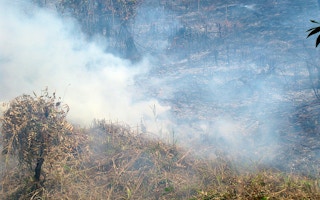On July 23 the local police headquarters in the Sumatran province of Riau released SP3 notices related to 15 companies that the Ministry of Environment and Forestry had listed in connection with last year’s fires. A SP3 is an official police document that confirms a case has been closed. No charges will be brought against any of the 15 firms.
“We are very disappointed with the issuance of the SP3,” said Riko Kurniawan, the executive director of the Indonesian Forum for the Environment (Walhi) in Riau province. It showed the police “lacked seriousness” in their pursuit of errant companies, he told Mongabay.
“This is one of the indicators to show how serious the government is — particularly law enforcement — to tackle forest fires,” added Greenpeace Indonesia forest campaigner Teguh Surya.
The El Nino weather event in 2015 prolonged the dry season and fueled annual fires that incinerated more than 2 million hectares in Indonesia. Much of what went up in smoke was highly combustible peat stored within marshes near the coastal areas of Riau, South Sumatra and West Kalimantan provinces.
The result was a national health emergency and a disastrous spike in Indonesia’s greenhouse gas emissions. At one point Indonesia’s chief security minister said Indonesia would commandeer ships from the state ferry company to evacuate the helpless in their thousands.
President Joko “Jokowi” Widodo has attempted to establish some control over Indonesia’s ubiquitous agricultural fires, which are often started by planters to clear land, since he flew home early from his first official visit to the U.S. last year to manage the emergency.
The president has hired former Wetlands International conservationist Nazir Foead to lead a newly created executive agency to restore 2 million hectares of peatland by 2020. Jokowi promised no repeat of last year’s wildfires and announced a moratorium on new oil palm plantation permits. Luhut Pandjaitan, a retired four-star general and senior member of the Indonesian cabinet, was assigned to bear down on companies.
On July 27 Pandjaitan expressed concern over the Riau Police decision and pledged to seek an explanation. “We want to check this first,” Luhut said on Tuesday. However, the following day Jokowi announced a long-awaited cabinet reshuffle, in which Wiranto replaced Pandjaitan as chief minister for home affairs. It is unclear whether Pandjaitan will retain the haze brief.
Senior officials from Riau Police traveled to Jakarta on July 27 to explain the decision to issue the SP3 notices, according to provincial police spokesman Guntur Aryo Tejo.
On July 28 presidential chief of staff Teten Masduki said Jokowi had instructed Indonesia’s new police chief, Tito Karnavian, to conduct a review of the SP3 notices. Teten implied the cases could still be reopened, adding that he had met this week with Karnavian and environment minister Siti Nurbaya Bakar to discuss the issue.
“
The unresolved cases above led to widespread destruction of forest and the people can see that above case has up to now not proceeded with no attempt made at legal action two years after our first report.
Tatik Indawati, head, Paser policy implementation unit, East Kalimantan
The head of the police’s intelligence bureau, known as Bareskrim, told reporters on July 28 that police had acted in accordance with the law, emphasising that “according to review there was no evidence of intent or negligence” on behalf of the companies.
“We believe if all the institutions are working together to strengthen law enforcement, then it will go smoothly,” said Greenpeace’s Teguh Surya.
A letter seen by Mongabay illustrates one example of the slow progression of police investigations and poor interagency communication — problems widely believed to be hampering progress toward holding lawbreaking companies to account and establishing a meaningful future deterrent.
The letter was sent by the head of a local policy implementation unit in Paser, a regency of more than 320,000 people in East Kalimantan province, to the office of the chief of East Kalimantan police. It refers to two police reports filed on June 19, 2014, and February 4, 2015, over the burning of land.
Nothing has been done more than 25 months since the first report, the letter alleges.
“The clearing of land for oil palm plantations is still ongoing to this day along with the opening of new land for the plantation of oil palm seedlings,” agency head Tatik Indawati writes.
“The unresolved cases above led to widespread destruction of forest and the people can see that above case has up to now not proceeded with no attempt made at legal action two years after our first report.”
The 2015 haze catastrophe will not be repeated with the same force this year due to the absence of prolonged drought wrought by El Nino. But scores of hotspots have sprung up in recent weeks, including in the areas of Riau where police have disbanded their investigation into 15 companies.
Greenpeace’s position is that the law is sufficiently clear to take companies to court for failing to prevent fires on their concessions. Prosecutors do not need to demonstrate that companies are responsible for starting, the NGO says. “Otherwise,” says Surya, “they will repeat it again and again and again.”
This story was published with permission from Mongabay.com










